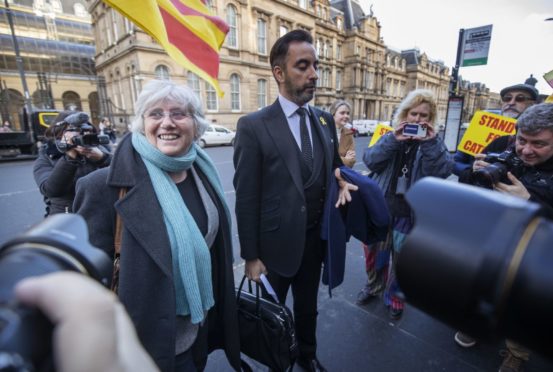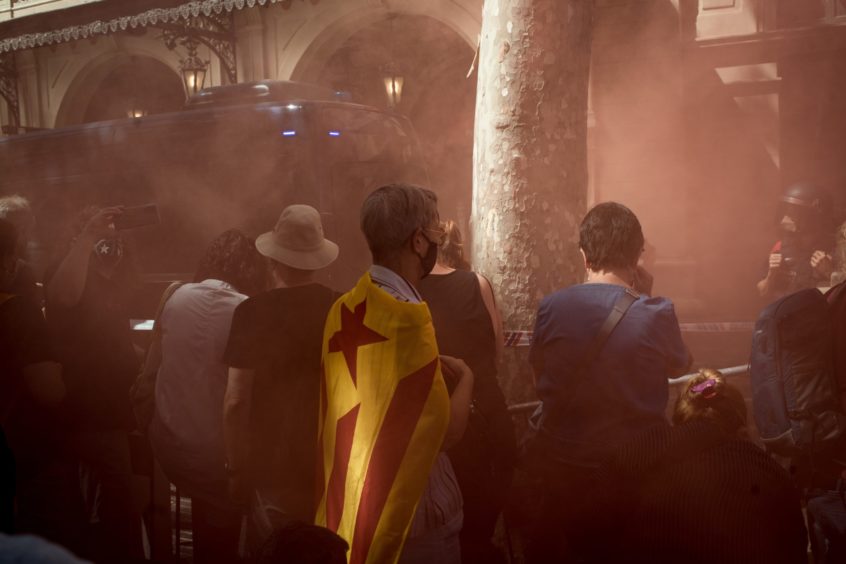A former St Andrews University academic who “refuses” to return to Scotland to face extradition proceedings over the 2017 Catalan independence referendum has had the case dismissed in a Scottish court.
Sheriff Nigel Ross ruled the Scottish justice system has “no jurisdiction” over the extradition of MEP Clara Ponsati to face a charge in Spain over her involvement in the unsanctioned vote because she has already left the country.
He agreed that the potential extradition of the former head of economics and finance at the Fife university is a “matter for the Spanish authorities” as the MEP has indicated she will not move back to Scotland from Belgium.
As he dismissed the case at Edinburgh Sheriff Court on Thursday, Mr Ross said: “Extradition in this case is impractical. You can’t extradite someone who is not here.”
The discharge was not opposed by the Crown’s lawyers, although they criticised a “clear breach of the position of trust that [Ms Ponsati] was in” over an alleged failure to tell the court she was resigning her post at St Andrews and moving to Belgium.
Highly unsatisfactory
Prosecutor John Scott QC told Mr Ross it was “highly unsatisfactory” for Ms Ponsati not to return to Edinburgh for the legal hearing, and that the academic broke the bail conditions which allowed her to remain at liberty.
He said she failed to notify the Scottish authorities of her move to Belgium to take up her role as an MEP and her resignation from the post at St Andrews.
1/17 statement – ‘This morning our legal team appeared at court on @ClaraPonsati’s behalf & it was agreed that she should be discharged as a requested person & these extradition court proceedings are now finally at an end in Scotland’🎗 pic.twitter.com/uqjoD50sV6
— Aamer Anwar🎗✊🏽#BlackLivesMatter (@AamerAnwar) August 26, 2021
The Spanish Government wants Ms Ponsati to stand trial in the country on the charge of sedition – the illegal act of inciting people to resist or rebel against a government.
The charge relates to Catalonia’s October 2017 independence referendum – which the Madrid-based government deemed illegal and refused to sanction.
Ms Ponsati could be sentenced to 15 years behind bars if convicted, with nine other Catalan officials given jail sentences of between nine and 13 years for the same offence in autumn 2019.
Not a flight risk
In November 2019, Ms Ponsati – who was education minister in the Catalonian government at the time of the vote – was granted bail from the court. It was argued that she was not a flight risk so was allowed to keep her passport.
Mr Scott told the court on Thursday that the Crown now had “little option” but to support her legal team’s request to halt the action.
He said: “In January 2020 when Ms Ponsati became a member of the European Parliament, a decision was taken that it would not be appropriate for her to to be prevented from taking her mandate as an MEP.
“The decision was taken on the clear understanding that Ms Ponsati would attend as required for any future extradition hearings in Scotland. No intimation was ever given of any change of address and no application was ever made to amend it.
“She also failed to intimate her decision to resign her post at the University of St Andrews, her most substantial link to Scotland. Ms Ponsati now refuses to return for any further hearings here in Scotland.
La justícia escocesa és, abans que res, justícia. A Europa és el que acostumem a trobar. En canvi, la justícia espanyola és, abans que res, espanyola. Aquesta és la gran diferència. Endavant @ClaraPonsati! https://t.co/GEA2jfLuML
— Carles Puigdemont (@KRLS) August 26, 2021
“The position of the Lord Advocate, on behalf of the Spanish judicial authority, is that these failures on the part of Ms Ponsati represent a clear breach of the position of trust that she was in.
“It is recognised that because of the conduct of Ms Ponsati – in breach of her position of trust and in breach of her conditions of bail – the Crown now has little option but to discharge her in respect of the current proceedings.
“It is highly unsatisfactory that these breaches have had the effect of preventing the court in Scotland from hearing the merits of this case.”
Acted lawfully
In 2019, Ms Ponsati’s lawyer, Gordon Jackson QC, argued there was no need for her to hand over her passport as she was settled in Scotland and “hasn’t had the slightest wish” to seek refuge in Belgium alongside other Catalan leaders.
On Thursday, Claire Mitchell QC told the court that Ms Ponsati acted “lawfully” in her dealings with the Scottish court and that the European Court of Justice recently ruled that Ms Ponsati and two fellow Catalan nationalists who were elected to the European Parliament could not be extradited to Spain.
Sheriff Ross said he noted the “differing” positions of the respective legal teams as he discharged the case against Ms Ponsati.
17/17 In conclusion, Clara wishes to thank the many people in Scotland as well as those across Europe, who have given her so much love, support and solidarity through difficult times and hopes that one day she can return from political exile to her beloved Catalonia🎗 pic.twitter.com/9y2syXinGN
— Aamer Anwar🎗✊🏽#BlackLivesMatter (@AamerAnwar) August 26, 2021
Speaking after the case was heard, Ms Ponsati’s solicitor, Aamer Anwar, said his client was convinced she would not receive a fair trial in Spain and thanked the “many people in Scotland, as well as those across Europe, who have given her so much love, support and solidarity through difficult times”.
He added: “For Clara, the European Arrest Warrant was always an example of ‘judicially motivated’ revenge by Spain.
“She maintained that there could be no guarantee of a right to a fair trial after the ‘show trials’ of nine Catalan politicians imprisoned for 100 years between them and now pardoned.
“A true democracy guarantees the absolute freedom of expression and politicians must be able to speak freely, independently and without fear of any form of prosecution or punishment, yet Spain stood accused of politically motivated prosecutions, driven by vengeance and a total contempt and lack of respect for international law and human rights.”
Mr Anwar said a full case on the MEP’s extradition to Spain remains to be heard at the European Court of Justice.

